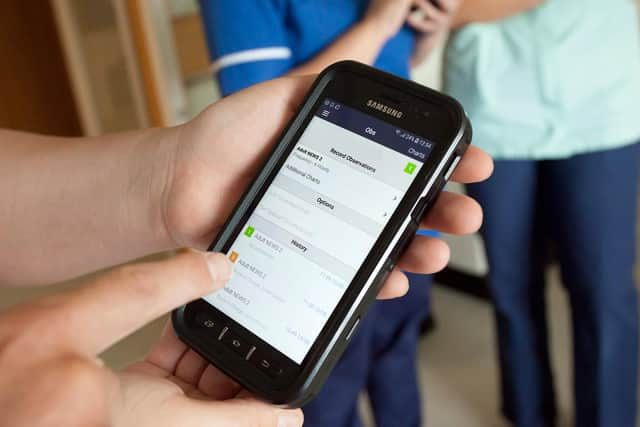Bassetlaw Hospital embarks on 'phase two' of digital transformation programme
and live on Freeview channel 276
Since 2018, the Digital Transformation team within the Doncaster and Bassetlaw Teaching Hospitals Trust have been working tirelessly to introduce new and innovative IT systems across the organisation’s three main hospital sites.
Among the many changes and developments during this time, one landmark achievement has been the introduction of ‘eObservations’ which, using a secure mobile phone, allows clinicians to record important patient information and analyse it instantly, as well as alerting colleagues if their condition has deteriorated.
Advertisement
Hide AdAdvertisement
Hide AdOne of the most important tasks within any hospital, ‘clinical observations’ is the term used to describe the multitude of tests and exercises which are used to monitor the health of a patient.


Undertaken at regular intervals, from temperature checks to heart rate monitoring, these observations help doctors and nurses understand the condition of their patients, guiding treatment if anything changes – a task which now been made easier, more efficient and less reliant on paper documentation by using the eObservations system.
Ken Anderson, chief information officer at the Trust, said: “I am pleased to say that the Digital Transformation Team have made a significant impact upon our services within the past 24 months, enhancing the care we provide to those staying with us.
"Undoubtedly, COVID-19 has underlined the importance of making the very best use of digital systems in all walks of life, and it is crucial that we further accelerate the pace of Digital Transformation within our hospitals, and that’s just what we intend to do as we move into phase two.”
Advertisement
Hide AdAdvertisement
Hide AdThe next phase of the programme will bring with it a host of further improvements, among which is ‘Nursing Assessments’.
This will mean digitising the current process when a patient is admitted to a ward area by recording patient details onto a secure digital portal creating a record for them which can be accessed by clinicians as necessary. By updating the process in this way, it eliminates the possibility of any paper notes being mislaid or misread, whilst updated information can be viewed in real-time for those nurses and doctors who need to see it.
Any additional assessments can be scheduled, giving the attending clinician a prompt for when further action is required.
Sue Bunn, Digital Transformation project manager at DBTH, said: “Moving to phase two of our Digital Transformation programme is a very exciting prospect for our hospitals.
Advertisement
Hide AdAdvertisement
Hide Ad"For a number of years, clinicians have made use of computers and disparate digital systems, however much of this work is about joining up these services and making them much more accessible and responsive.
“The work we are embarking upon will expand upon the innovations we have brought to the Trust in the past 18 months or so, as well as building upon this strong foundation – ultimately improving the care provided to our patients, as well as enhancing the working lives of our clinicians throughout the hospital.”
Phase two of the Trust’s Digital Transformation journey will begin this month (June 2021), with the implementation of Nursing Assessments across all adult wards at Bassetlaw Hospital and in Doncaster Royal Infirmary from June 21.